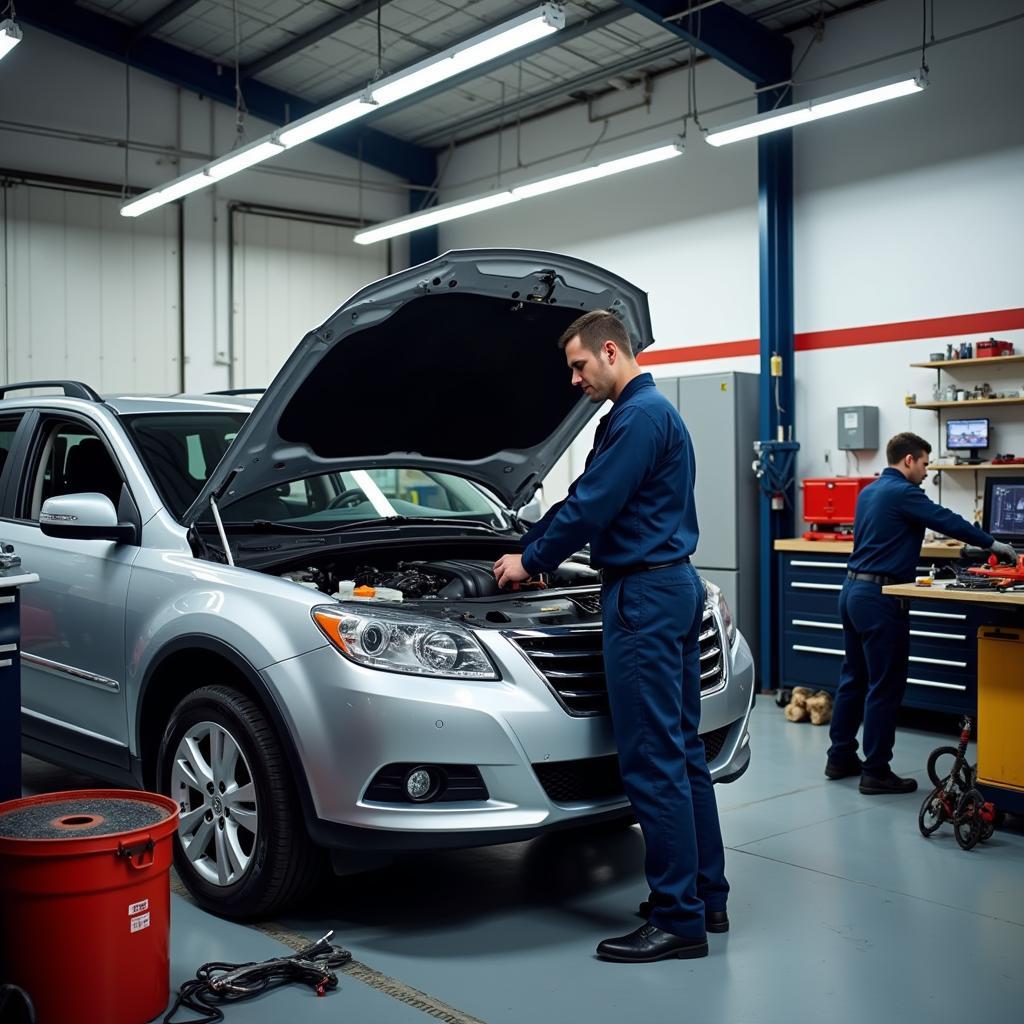Experiencing the dreaded blast of hot air when you turn on your car’s AC? Don’t sweat it! Getting your car AC fixed is a common repair, and understanding the process can help you stay cool and in control. This comprehensive guide will walk you through everything you need to know, from diagnosing the problem to finding reliable repair options.
Let’s face it, a malfunctioning AC system is more than just an inconvenience, especially during scorching summer months. How much is it to get your car ac fixed? The cost can vary depending on the issue, but understanding the potential problems and solutions will equip you to make informed decisions.
Common Car AC Problems: Why is My AC Not Working?
Before diving into solutions, it’s crucial to understand the potential culprits behind your AC woes. Here are some of the most common car AC problems:
- Refrigerant Leak: Your car’s AC relies on refrigerant to cool the air, and leaks are a common culprit for a malfunctioning system.
- Compressor Issues: The compressor is the heart of your AC system, responsible for circulating the refrigerant. If it fails, your AC won’t be able to cool the air effectively.
- Electrical Problems: From blown fuses to faulty wiring, electrical issues can disrupt the power supply to your AC system, rendering it useless.
- Condenser Problems: The condenser acts like a radiator, releasing heat from the refrigerant. If it’s blocked or damaged, your AC system’s efficiency will suffer.
- Evaporator Problems: Located inside the dashboard, the evaporator is responsible for cooling the air that blows into your cabin. A malfunctioning evaporator can lead to weak or warm airflow.
DIY or Seek Professional Help: Can I Fix My Car AC Myself?
While some car maintenance tasks are suitable for DIY enthusiasts, fixing your car AC often requires specialized knowledge, tools, and experience. Attempting complex repairs yourself could lead to further damage and costly repairs down the line.
When to Consider DIY:
- Simple tasks: If you’re comfortable with basic car maintenance, you might be able to tackle tasks like checking and replacing the cabin air filter, inspecting the serpentine belt, or checking fuses.
- Experience and Knowledge: Only attempt DIY repairs if you have a good understanding of car AC systems and the proper safety procedures involved.
When to Seek Professional Help:
- Complex Issues: For issues like refrigerant leaks, compressor problems, or electrical faults, it’s best to consult a qualified mechanic specializing in car AC repair.
- Lack of Experience: If you’re not comfortable working with car AC systems, don’t hesitate to seek professional help. It’s better to be safe than sorry.
 Car AC Repair Shop
Car AC Repair Shop
Finding a Reputable Mechanic: Where Can I Get My Car AC Fixed?
Choosing the right mechanic can make all the difference in the quality and cost of your car AC repair. Here’s what to look for:
- Experience and Specialization: Seek out mechanics or repair shops specializing in car AC systems. They’ll have the expertise and tools to diagnose and fix the problem efficiently.
- Certifications and Reviews: Look for certifications like ASE (Automotive Service Excellence) and check online reviews from previous customers to gauge their reputation.
- Warranties: Reputable mechanics stand behind their work and offer warranties on parts and labor.
If you’re unsure [where can i go to get my car ac fixed](https://autotippro.com/where-can i-go-to-get-my-car-ac-fixed/), consider asking friends, family, or online communities for recommendations.
Preventing Future AC Problems: Keep Your Cool All Year Round
Just like any other system in your car, preventative maintenance is key to keeping your AC running smoothly and avoiding costly repairs.
- Regular Servicing: Schedule regular AC checkups, especially before the summer months.
- Check Refrigerant Levels: Low refrigerant levels can indicate a leak. Have your mechanic check and top up the refrigerant if needed.
- Keep it Clean: Regularly clean the area around the condenser to prevent debris buildup, which can affect its performance.
Conclusion: Stay Cool and Comfortable on the Road
Don’t let a broken AC system put a damper on your driving experience. By understanding the common problems, knowing when to seek professional help, and following preventative maintenance tips, you can keep your car cool and comfortable all year round.
Need help getting your AC fixed? Contact AutoTipPro at +1 (641) 206-8880 or visit our office at 500 N St Mary’s St, San Antonio, TX 78205, United States. Our team of expert mechanics is here to keep you cool and comfortable on the road.
FAQs about Getting Your Car AC Fixed
1. How often should I get my car AC serviced?
It’s generally recommended to have your car AC serviced at least once a year, ideally before the start of summer.
2. How long does it take to fix a car AC?
The repair time can vary depending on the complexity of the problem. Simple repairs like recharging refrigerant can take an hour, while more complex issues might require several hours or even days.
3. Can I drive my car with a broken AC?
While it’s technically possible to drive with a broken AC, it’s not recommended, especially during hot weather. Driving without AC can be uncomfortable and potentially dangerous, especially for long periods.
4. How much does it cost to replace a car AC compressor?
Compressor replacement is one of the most expensive car AC repairs, often costing between $500 and $1000 or more, depending on the make and model of your car.
5. How can I tell if my car AC needs refrigerant?
Signs of low refrigerant include weak airflow from the vents, warm air blowing instead of cold, and hissing or bubbling sounds coming from the AC system.




Leave a Reply